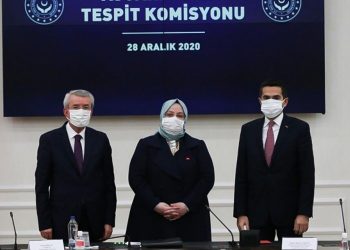by Professor Cengiz Aktar
On 10-11 December, the regular European Council meeting will take place. The agenda is crowded with COVID-19, climate change, trade, security, the Hungaro-Polish veto of the 1.7 trillion € 2021-2027 budget as well as external relations. External relations is mostly about how to rebuke Turkey as a result of the continuous problems and tensions the Ankara regime creates with its former European partners, not to mention the constant insults and belittling of European leaders by Recep Tayyip Erdoğan, as evidenced by his scandalous utterance: “You are fascists in the true meaning of the world. You are veritably the link in the Nazi chain”.
The issues are plentiful: the end of the rule of law, utterly repressive domestic practices, a belligerent attitude in the Aegean and Eastern Mediterranean, the invasion of Syrian Kurdish territories, a disruptive attitude in the search for peace in Libya, buying Russian defence systems against NATO rules, jeopardizing NATO solidarity by vetoing the Alliance’s Baltics/Poland defence plan, illegal aggressive moves in the occupied part of Cyprus, weaponizing refugees and migrants against Europe …

The EU’s responses to these anti-European attitudes and policies that go on for years have been either limited (and thus ineffective) or unbinding as in the case of European Parliament resolutions. As for the real power base, the European Council, the reactions have always been watered down by a group of countries openly pro-Erdoğan, composed of Germany, Hungary, Italy, Malta and Spain.
It is highly likely that the same will happen again at the 10-11 December meeting, especially when Ankara – following the good advice of Berlin – has been making “constructive” gestures over the past few days in order to give arguments to Berlin to avoid sanctions. In any case, all this wheeling and dealing points to a harsh new reality: “Erdoğan” and “Turkey” are, as of now, bearing totally negative connotations in Europe. Even the most pro-Erdoğan circles, power brokers and countries are cautious about speaking positively about them.
This new state of affairs doesn’t augur well for the people of Turkey, unfortunately, as none of the substantial relations and issues between Turkey and the EU have any potential to move forward. Relations with the EU institutions are increasingly problematic. The Commission is busy pushing papers and its yearly Progress Reports on Turkey’s advancement toward membership which look more and more like “Regression Reports” are ostensibly thrown in the waste paper bin by Turkish officials. The pre-accession funds (€4,453 billion for the EU budgetary period for 2014–2020) have been severely underutilized (10% only) due to a lack of adequate projects.
Relations with the European Parliament are at their lowest level. Recommendations of the Parliament to freeze and later to suspend the accession negotiations have been patently ignored by Ankara. Lately, a very critical resolution was adopted with overwhelming support against the fait accompli of Varosha in Cyprus. The draft report of the Turkey Rapporteur Sanchez Amor is very critical as well.

At the European Council level, some governments have introduced in their own governmental action plan the rebuttal of Turkey’s membership, like Austria and Germany. Others like France have openly told their Turkish counterparts about the same outcome. Every single European decision maker knows that in Brussels’ terminology, Turkey does not comply anymore with the Copenhagen Criteria, the compulsory benchmark for every candidate country. In Europe, there is no government in favour of Turkey’s EU membership and public opinion is equally critical of this.
This state of affairs has been translated into a Council decision which took note of the standstill and declared on 26 June 2018: “The Council notes that Turkey has been moving further away from the European Union. Turkey’s accession negotiations have, therefore, effectively come to a standstill and no further chapters can be considered for opening or closing and no further work towards the modernisation of the EU-Turkey Customs Union is foreseen”. The declaration is short of a formal end of membership negotiations as it is difficult to reach unanimity, given that Germany, Hungary, Italy, Malta and Spain will refrain from publicly antagonizing Turkey for the sake of their vested interests. Nevertheless, Turkey’s exclusion is indirectly mentioned in several official documents. Finally, there is no more political dialogue on issues of common concern except ad hoc deals such as policing refugee movements by Ankara.

Membership negotiations now put aside by a tacit understanding of parties, there remain two key issues on which the Ankara regime seems stubborn – the revision of the Customs Union and the Schengen visa waiver for citizens of Turkey.
In effect since 1 January 1996, the Customs Union decision needs, indeed, to be reviewed and readapted. Advantages Turkey had acquired since the making of the deal have now been eroded over the years. Globalization, the EU’s 2004 and 2007 eastward enlargements, the exclusion of services and unprocessed agricultural goods from its coverage, visa requirements for Turkish business people whereas their EU counterparts travel visa-free to Turkey, and most importantly, the lack of progress in its membership bid are the most important reasons that explain this situation.
One should recall that the Customs Union was always considered as a step that had to be taken before full membership could be granted. And without membership, it would always remain half-completed. Although its revision is long overdue, the EU party has been slow to react whereas the Turkish party has been more vocal. Now, with the deep-freezing of formal relations and unyielding opposition by some member states and the European Parliament, it looks very difficult to go ahead with the revision. Those who still hope to tie the revision of the Customs Union to conditions of economic and political good governance have illusions with regard to the present regime as its codes are structurally anti-European. Likewise, those member states which are against the continuation of negotiations are also against the revision of the Customs Union. Not to mention the recommendation of the European Parliament in late October 2019 by a huge majority, to suspend entirely the Customs Union as a retaliatory measure following the Turkish army’s assault on Syrian Kurdish territory.
The exemption from the Schengen visa has been incorrectly negotiated since 2013. At this stage, one should note that although visa-free travel is, legally speaking, the right of citizens of Turkey, the ultimate obstacle remains political. Nevertheless, the presence of Turkish nationals amongst ISIS ranks, a growing Islamophobia and Turcophobia in Europe, huge numbers of unemployed as well as potential asylum seekers of Turkish nationality whose number is increasing due to the political situation, are taken into account by the EU policymakers, thus preventing any positive outcome.
For Europeans, prospects of Turkey’s EU membership and the feasibility of binding agreements (revision of the Customs Union, visa exemption) have become remote. From now on, Turkey is just another third country for the EU, independent from the way it is being ruled. The only difference between Turkey and other ‘Third World’ countries is that the former is geographically right next to Europe.
As a consequence of these negative agendas, much needed EU trade and EU funds will completely dwindle over time, which in turn will deepen the economic crisis already in place in Turkey because of bad management, wasteful spending, costly warfare and the pandemic. The horizon looks bleak, to put it mildly.
Cengiz Aktar is a professor of political science presently teaching at the University of Athens EKPA.

















